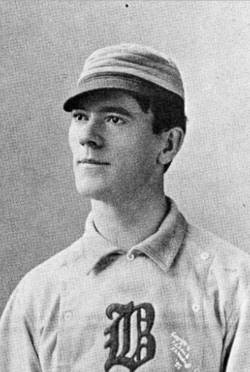Marty Bergen (Martin Bergen)

Born in North Brookfield, Massachusetts, Marty Bergen attracted attention while playing for a series of teams from 1892 to 1895. But his behavior was mercurial. Batting .372, Bergen left the Kansas City Blues suddenly in 1895 over a perceived slight, and never again played for the team. Boston had scouted him, and was quick to purchase his contract for $1,000. Within a year, Bergen had established a reputation for throwing out baserunners. Bergen played in 344 major league games for the Beaneaters teams, who won two straight National League pennants (1897–1898), and finished in second place in 1899. As a catcher, he had mixed results, as exemplified by the 1898 season. On the plus side, he had a Range factor of 5.17 in 1898—well above the league average of 4.60 for catchers. However, Bergen also led the league’s catchers with 24 errors and 38 passed balls. He had a career batting average of .258 with 69 extra base hits and 176 RBIs. Future Hall of Famer Jesse Burkett enthusiastically described Marty Bergen’s skills in 1900: “As a catcher, Martin Bergen was the best the world ever produced. No man acted with more natural grace as a ballplayer. There was finish in every move he made. His eye was always true, and his movements so quick and accurate in throwing that the speediest base runners … never took chances when Bergen was behind the bat.”
Marty Bergen’s teammates appreciated his strong arm and hustling style of play, but relations between the catcher and the team soured following an altercation with Vic Willis in which Bergen inexplicably slapped him while eating breakfast. The team’s mixed emotions were expressed by an anonymous Boston player quoted in the press: “He has made trouble with a good many of the boys and we just give him a wide berth. But he’s a ballplayer, and once we get into a game, personal feelings are set aside in admiration of the artist, for such he is.” Bergen’s condition worsened in 1899, which led to internal turmoil for the Beaneaters. He was having hallucinations that enemies were trying to poison him. His son died in April, and Bergen imagined that his teammates were making jokes behind his back about the death. He began sitting in particular positions, and walking sideways, so that he could spot assassins approaching from either side of him. Boston’s team president urged the other players to avoid Bergen, fearing what he might do. Some blamed his condition on heavy drink, but Bergen was regarded by others as a teetotaler. In mid-July 1899, Marty Bergen silently walked off the team’s train at the beginning of a road trip, leaving Boston with just a backup catcher during a heated pennant race. However, he was lustily cheered by fans upon his return to the team. In September, Bergen disappeared again for a few days, then showed up unannounced a few minutes before a game and put on his catching gear without speaking to anyone. On October 9, Bergen had to be removed from a game when he dodged the pitches rather than catching them, because he was preoccupied with avoiding knife thrusts from an invisible assailant. Bergen was aware of his mental state, and actively sought help from both clergy and physicians. However, he refused to take any of the bromides prescribed by his doctor, explaining, “I thought someone in the National League had found out that you were my family physician and had arranged to give me some poison. I did not take it from my wife because I didn’t wish hers to be the hand that poisoned me.”
One book on Boston baseball history recounts that after his son’s death, Marty Bergen “would catch a few games, then ask manager Frank Selee if he could return home for a few days.” When Selee refused permission, Bergen would go home anyway. Bergen complained that players kept reminding him of his son who had died, and he resented a $300 fine imposed for being AWOL. “Black moods came on Bergen who seemed to be happy only when on his farm in North Brookfield.” Several players said they would not return to the Beaneaters in 1900 if the increasingly erratic Bergen was still with the club. There were also reports that Bergen had suffered a career-ending broken hip during a game in the 1899 season. In January 1900, at his home in North Brookfield, Massachusetts, the 28-year-old Marty Bergen ended his life in murder-suicide. Bergen killed his wife and two children with an axe, then used a straight razor to cut his own throat with such force that he nearly beheaded himself.
Born
- October, 25, 1871
- USA
- North Brookfield, Massachusetts
Died
- January, 19, 1900
- USA
- North Brookfield, Massachusetts
Cause of Death
- suicide
Cemetery
- Saint Joseph Cemetery
- North Brookfield, Massachusetts
- USA



